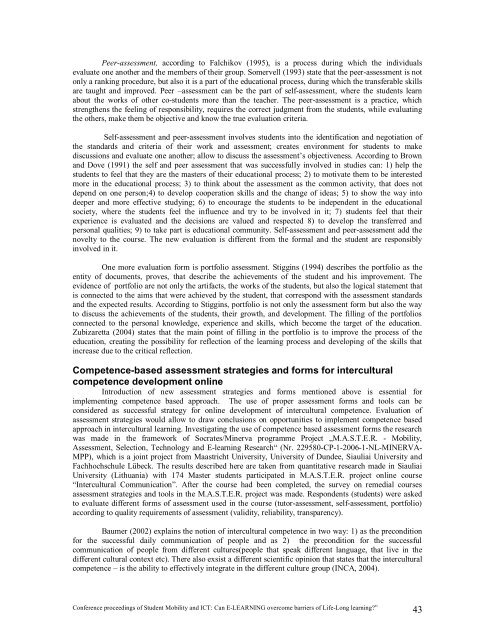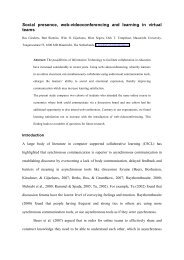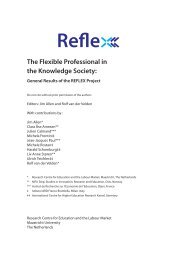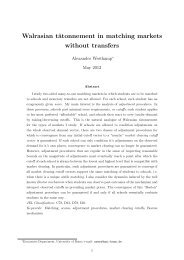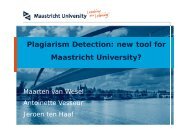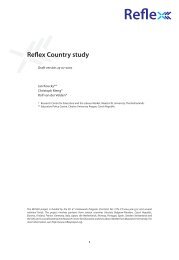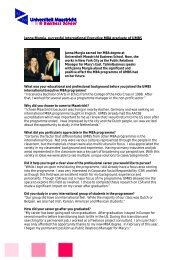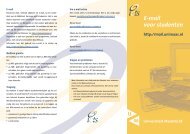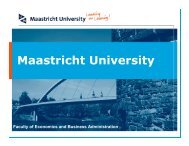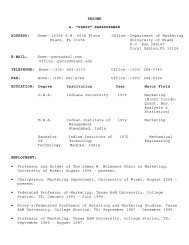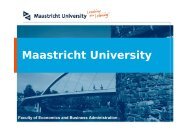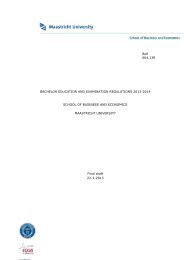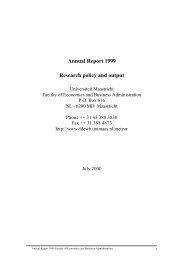proceedings of Student Mobility and ICT: Can E-LEARNING
proceedings of Student Mobility and ICT: Can E-LEARNING
proceedings of Student Mobility and ICT: Can E-LEARNING
You also want an ePaper? Increase the reach of your titles
YUMPU automatically turns print PDFs into web optimized ePapers that Google loves.
Peer-assessment, according to Falchikov (1995), is a process during which the individuals<br />
evaluate one another <strong>and</strong> the members <strong>of</strong> their group. Somervell (1993) state that the peer-assessment is not<br />
only a ranking procedure, but also it is a part <strong>of</strong> the educational process, during which the transferable skills<br />
are taught <strong>and</strong> improved. Peer –assessment can be the part <strong>of</strong> self-assessment, where the students learn<br />
about the works <strong>of</strong> other co-students more than the teacher. The peer-assessment is a practice, which<br />
strengthens the feeling <strong>of</strong> responsibility, requires the correct judgment from the students, while evaluating<br />
the others, make them be objective <strong>and</strong> know the true evaluation criteria.<br />
Self-assessment <strong>and</strong> peer-assessment involves students into the identification <strong>and</strong> negotiation <strong>of</strong><br />
the st<strong>and</strong>ards <strong>and</strong> criteria <strong>of</strong> their work <strong>and</strong> assessment; creates environment for students to make<br />
discussions <strong>and</strong> evaluate one another; allow to discuss the assessment’s objectiveness. According to Brown<br />
<strong>and</strong> Dove (1991) the self <strong>and</strong> peer assessment that was successfully involved in studies can: 1) help the<br />
students to feel that they are the masters <strong>of</strong> their educational process; 2) to motivate them to be interested<br />
more in the educational process; 3) to think about the assessment as the common activity, that does not<br />
depend on one person;4) to develop cooperation skills <strong>and</strong> the change <strong>of</strong> ideas; 5) to show the way into<br />
deeper <strong>and</strong> more effective studying; 6) to encourage the students to be independent in the educational<br />
society, where the students feel the influence <strong>and</strong> try to be involved in it; 7) students feel that their<br />
experience is evaluated <strong>and</strong> the decisions are valued <strong>and</strong> respected 8) to develop the transferred <strong>and</strong><br />
personal qualities; 9) to take part is educational community. Self-assessment <strong>and</strong> peer-assessment add the<br />
novelty to the course. The new evaluation is different from the formal <strong>and</strong> the student are responsibly<br />
involved in it.<br />
One more evaluation form is portfolio assessment. Stiggins (1994) describes the portfolio as the<br />
entity <strong>of</strong> documents, proves, that describe the achievements <strong>of</strong> the student <strong>and</strong> his improvement. The<br />
evidence <strong>of</strong> portfolio are not only the artifacts, the works <strong>of</strong> the students, but also the logical statement that<br />
is connected to the aims that were achieved by the student, that correspond with the assessment st<strong>and</strong>ards<br />
<strong>and</strong> the expected results. According to Stiggins, portfolio is not only the assessment form but also the way<br />
to discuss the achievements <strong>of</strong> the students, their growth, <strong>and</strong> development. The filling <strong>of</strong> the portfolios<br />
connected to the personal knowledge, experience <strong>and</strong> skills, which become the target <strong>of</strong> the education.<br />
Zubizaretta (2004) states that the main point <strong>of</strong> filling in the portfolio is to improve the process <strong>of</strong> the<br />
education, creating the possibility for reflection <strong>of</strong> the learning process <strong>and</strong> developing <strong>of</strong> the skills that<br />
increase due to the critical reflection.<br />
Competence-based assessment strategies <strong>and</strong> forms for intercultural<br />
competence development online<br />
Introduction <strong>of</strong> new assessment strategies <strong>and</strong> forms mentioned above is essential for<br />
implementing competence based approach. The use <strong>of</strong> proper assessment forms <strong>and</strong> tools can be<br />
considered as successful strategy for online development <strong>of</strong> intercultural competence. Evaluation <strong>of</strong><br />
assessment strategies would allow to draw conclusions on opportunities to implement competence based<br />
approach in intercultural learning. Investigating the use <strong>of</strong> competence based assessment forms the research<br />
was made in the framework <strong>of</strong> Socrates/Minerva programme Project „M.A.S.T.E.R. - <strong>Mobility</strong>,<br />
Assessment, Selection, Technology <strong>and</strong> E-learning Research“ (Nr. 229580-CP-1-2006-1-NL-MINERVA-<br />
MPP), which is a joint project from Maastricht University, University <strong>of</strong> Dundee, Siauliai University <strong>and</strong><br />
Fachhochschule Lübeck. The results described here are taken from quantitative research made in Siauliai<br />
University (Lithuania) with 174 Master students participated in M.A.S.T.E.R. project online course<br />
“Intercultural Communication”. After the course had been completed, the survey on remedial courses<br />
assessment strategies <strong>and</strong> tools in the M.A.S.T.E.R. project was made. Respondents (students) were asked<br />
to evaluate different forms <strong>of</strong> assessment used in the course (tutor-assessment, self-assessment, portfolio)<br />
according to quality requirements <strong>of</strong> assessment (validity, reliability, transparency).<br />
Baumer (2002) explains the notion <strong>of</strong> intercultural competence in two way: 1) as the precondition<br />
for the successful daily communication <strong>of</strong> people <strong>and</strong> as 2) the precondition for the successful<br />
communication <strong>of</strong> people from different cultures(people that speak different language, that live in the<br />
different cultural context etc). There also exsist a different scientific opinion that states that the intercultural<br />
competence – is the ability to effectively integrate in the different culture group (INCA, 2004).<br />
Conference <strong>proceedings</strong> <strong>of</strong> <strong>Student</strong> <strong>Mobility</strong> <strong>and</strong> <strong>ICT</strong>: <strong>Can</strong> E-<strong>LEARNING</strong> overcome barriers <strong>of</strong> Life-Long learning?” 43


